|
|
.png)
International Amateur Pair Go Championship
With the aim of promoting Go among women worldwide the International Amateur Pair Go Championship (IAPGC) was started in Japan in 1990. Now representatives of 22 countries and all regions of Japan come together annually for this world championship. In addition there are separate handicap groups (the Araki Cup) held alongside that get in excess of 300 Japanese players.
In 1990 only Japan, China, Korea and Taiwan took part. In 1991 there were 12 countries as France, Germany, Netherlands, Russia, UK, USA, Canada and Hong Kong joined. In 1992 two more European countries were added on rotation (Czechia and Poland in 1992). For subsequent years 8 or 9 European countries took part, with the four of the big five taking part on rotation and others selected to take part with priority given to new countries and ones that had not played recently. From 2004 a points system was introduced based on the country Go playing population size and the results in the European Pair Go Championships (again with priority given to new countries). By 2006 some 35 European countries had taken part and by 2007 65 countries world wide.
The event came of age in 2009 with its 20th edition. As well as a demonstration pro Pair Go game, there were awards for the biggest contributions to the promoting of Pair Go and an essay competition won by Manja and Micha Marz from Germany with Pair Go May Change Your Life. In 2014 the 25th edition was reached, with 30 promoters of world-wide Pair Go invited to join in the celebration.
Until 1999 Japan had won most often (six times), having the home advantage of having several teams taking part, but Korea has now won more than 10 times. China have won five times, North Korea twice and Chinese Taipei (Taiwan) once. The most famous winner is Umezawa Yukari (now Yoshihara Yukari), who is now 5 dan pro, who won in 1994.
Best Dressed
A feature of the IAPGC is always the best dressed couple prize, which helps encourage a smart turn out from the competitors. In addition on the first day of the event the international competitors are encouraged to wear national dress. This leads to some very bright and colourful costumes being seen, though of course some of the countries struggle to work out what their national dress might be!
Pair Go Tee Shirt
|
A new tee shirt has been produced in 2007 to celebrate the IAPGC. It has the IAPGC logo on the front and appropriate calligraphy by top artist Takagi Seiu on the back. Translated into English it says: "In Pair Go, when you win the pleasure is doubled, when you lose the chagrin is halved." There is also an annual IAPGC towel. 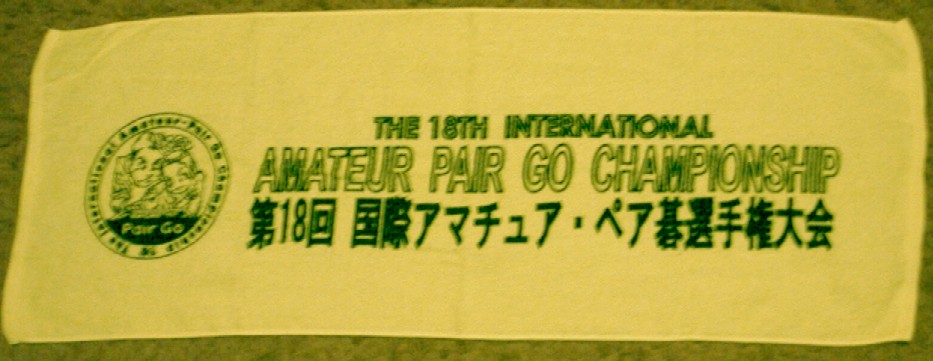
|
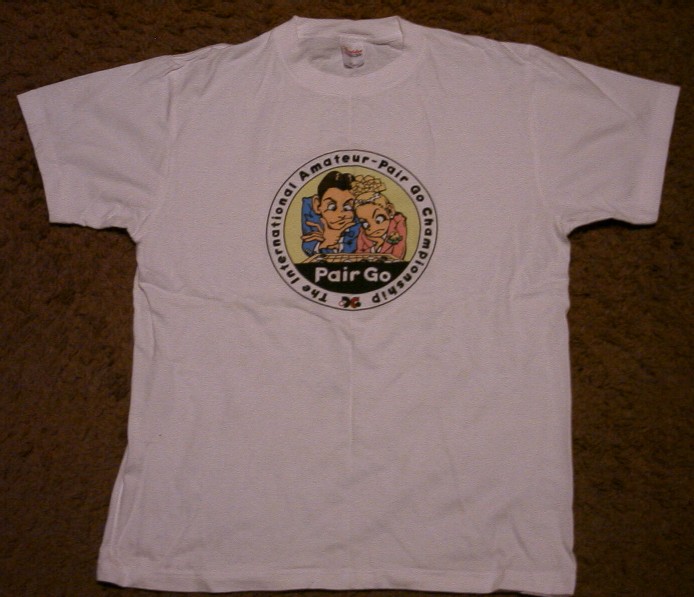 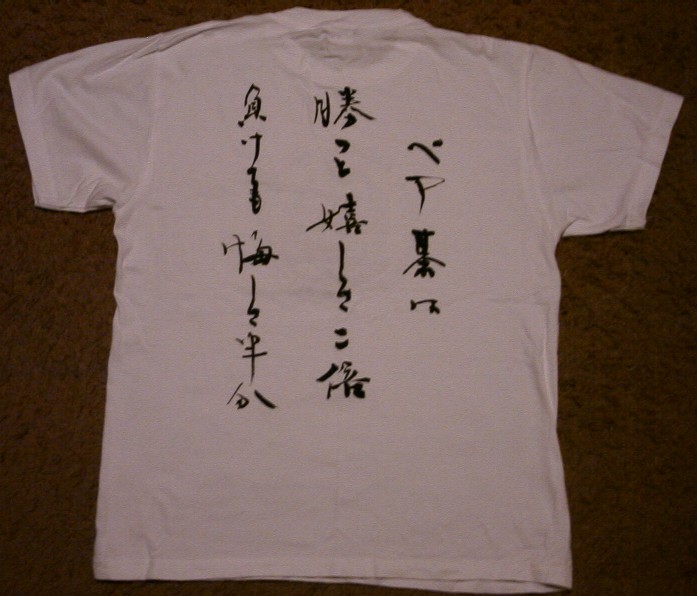 |
Pair Go Song
As part of the celebrations of the 25th Anniversary edition, a new Pair Go pop song was introduced, a duet with lyrics in Japanese with English translation. It is called Pair Go, My Dream.
International Friendship Match
Also on the first day a goodwill game is played, with partners drawn at random. As well as the IAPGC competitors, various professionals and important Japanese players (such as Go journalists, trainers and sponsors) take part. So you can find yourself playing against a 9p such as Mike Redmond or partnering a lady in a beautiful Japanese kimono. This always is a pleasant and interesting time.
Results and Winners
- 2017 Results Japan
- 2016 Results Korea
- 2015 Results Korea
- 2014 Results Korea
- 2013 Results Korea
- 2012 Results Korea
- 2011 Results Korea
- 2010 Results Korea
- 2009 Results and Photographs Korea
- 2008 Results (held at WMSG) Korea
- 2007 Results and Photographs Korea
- 2006 Results Korea
- 2005 Results and Photographs China
- 2004 Results North Korea
- 2003 Results Korea
- 2002 Results China
- 2001 Results and Photographs China
- 2000 Results and Photographs North Korea
- 1999 Results and Reports Japan
- 1998 Results and Photographs Korea
- 1997 Results Taiwan
- 1996 Results Japan
- 1995 Results Korea
- 1994 Results Japan
- 1993 Results Japan
- 1992 Results Japan
- 1991 Results China
- 1990 Results Japan
For Europe, Hungary have had two places in the top seven: 7th in 1997 and an excellent 4th in 2003, when father and daughter Tibor and Rita Pocsai won 4 games out of 5. Natalia Kovaleva and Dmitrij Surin from Russia won 4 games to come 6th in 2007.
In 2008 the 19th IAPGC was part of the World Mind Sports Games in Beijing. The top amateur team received the title. It was open to pairs from any country and the top 6 European countries from the previous 9 IAPGCs received official support (Russia, Hungary, Germany, Czechia, France and UK).
Yuki Shigeno's report on IAPGC 2005
Pair Go Promotion Partners
In order to encourage promotion of Pair Go around the world, the IAPGC players are afterwards encouraged to sign up as Pair Go Promotion Partners. They are given the red PGPP passport book to remind them of what the aims of Pair Go are. They are then expected to enthuse about Pair Go back in their own country, hence promoting the game.
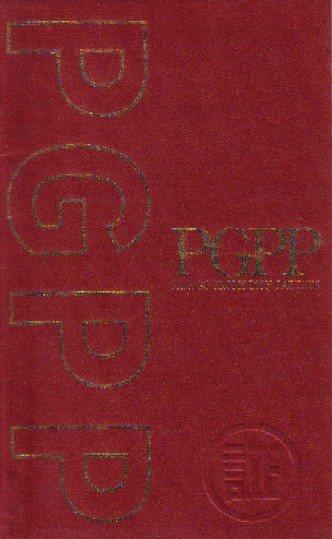
|
PGPP members:
|
Pair Go Around the World
As well as Pair Go in Europe, one of the biggest Pair Go championships outside Japan is played in America. In the Pair Go at the annual US Go Congress, up to 100 players take part. The US has been starting other local Pair Go events, such is the popularity of Pair Go, and has a Facebook page. Many other countries also run Pair Go events and championships.
In March 2010 the first Pair Go World Cup was held in China with 8 pro pairs from the Orient and 8 pairs from the rest of the world; it was won by Rong Hui Song and He Xie of China. Pair Go became part of the Asian Games from 2010 (the first event being won by Korea's Park Jeong Hwan and Lee Seu La). It was also featured in the first Chinese Mindsports Games.
Pair Go also features in the World Mind Sports Games, won in Beijing in 2008 by Fan Weijing / Hang Yizhong of China and in 2012 in Lille by Osawa / Nakasone of Japan. The top game records from 2012 are on the Pandanet website.
Pair Go has been held at the SportAccord World Mind Games since the first edition in 2011. Europe, North America, and the four top countries get to play, but it is usually the home team of China that wins. It was also part of the first IMSA Elite Mind Games in 2016.
- 2016 Korea (Choi Jeong / Park Jeonghwan)
- 2014 China (Yu Zhiying / Mi Yuting)
- 2013 China (Wang Chenxing / Zhou Ruiyang)
- 2012 Korea (Choi Jeong / Choi Chulhan)
- 2011 China (Li He / Piao Wenyao)
A booklet, The Path of Pair Go, was published in 2009 tracing the history of Pair Go.
Of course the IAPGC is the senior Pair Go event of the year. You can read reports about some of the editions by following the results links above.
Japanese Professionals
|
Every year the best Japanese women professional players are allocated a top male professional partner for the Professional Pair Go Championship. The first such event was in 1994. Qualifying stages are nowadays played early in December, followed by a final early in the new year. There is also a similar tournament in China. Until 2009 this was the RICOH Cup. In 2010 only the event was changed to select two pairs to take part in the new Pair Go World Cup, launched to celebrate 20 years of Pair Go. |
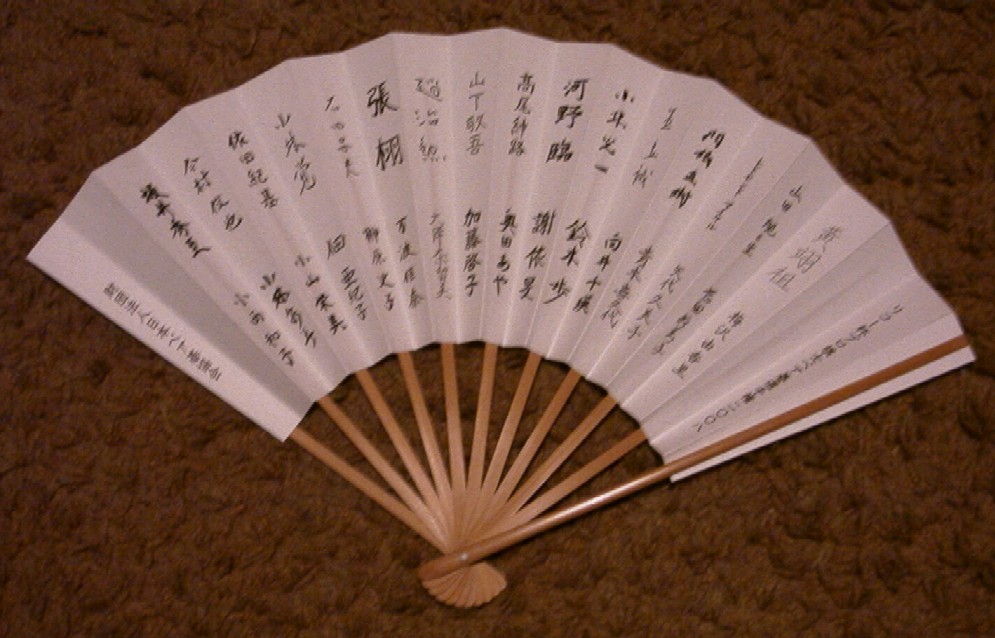 |
- 2018 Kato Keiko (6 dan) and Iyama Yuta (9 dan)
- 2017 Fujisawa Rina (3 dan) and Hane Naoki (9 dan)
- 2016 Wang Jing Yi (2 dan) and Murakawa Daisuke (8 dan)
- 2015 Koyama Terumi (6 dan) and Hane Naoki (9 dan)
- 2014 Yoshiro Kumiko (6 dan) and Iyama Yuta (9 dan)
- 2013 Xie Yimin (6 dan) and Kobayashi Satoru (9 dan)
- 2012 Xie Yimin (5 dan) and O Meien (9 dan)
- 2011 Xie Yimin (5 dan) and O Meien (9 dan)
- 2010 Ishii Akane/Sakai Hideyuki and Umezawa Yukari/Takao Shinji
- 2009 Kato Keiko (5 dan) and Hane Naoki (9 dan)
- 2008 Osawa Narumi (3 dan) and Cho Chikun (9 dan)
- 2007 Okada Yumiko (6 dan) and Yamada Kimio (9 dan)
- 2006 Suzuki Ayumi (3 dan) and Cho U (9 dan)
- 2005 Aoki Kikuyo (8 dan) and Mimura Tomoyasu (9 dan)
- 2004 Kobayashi Izumi (5 dan) and Yamashita Keigo (9 dan)
- 2003 Inori Yoko (5 dan) and Cho Chikun (9 dan)
- 2002 Inori Yoko (5 dan) and Cho Chikun (9 dan)
- 2001 Kusunoki Teruko (7 dan) and Yoda Norimoto (9 dan)
- 2000 Yoshida Mika (6 dan) and Tono Hiroaki (9 dan)
- 1999 Aoki Kikuyo (7 dan) and Honda Kunihisa (9 dan)
- 1998 Aoki Kikuyo (7 dan) and Honda Kunihisa (9 dan)
- 1996 Chinen Kaori (2 dan) and Yuki Satoshi (8 dan)
- 1995 Kobayashi Izumi (1 dan) and Kobayashi Koichi (9 dan)
- 1994 Konishi Kazuko (4 dan) and Hashimoto Shoji (9 dan)
Other Oriental Pair Go
Pair Go is also now starting to take off with the professionals of China and Korea. In 2012, the second SG Cup in Korea was won by Choi Cheong and Yoo Chang Hyeok.
In April/May 2013 a Tri-Nation Pair Go Championship for professionals was held in Heifei in China. The winners were Chenxing Wang 5p and Chang Hao 9p of China, ahead of Korea and Japan.
In late 2013 the four big countries competed in the Futian Cup in Shenzhen; the winners were Kong and Ma of China (ahead of Korea). Alongside a small amateur event for Pair Go promoters was won by Osawa and Matsuura of Japan ahead of China, and Europe (Natalia Kovaleva and Martin Stiassny) was third ahead of the USA.
The number of international tournaments has increased with at least three held in 2016.
.png)